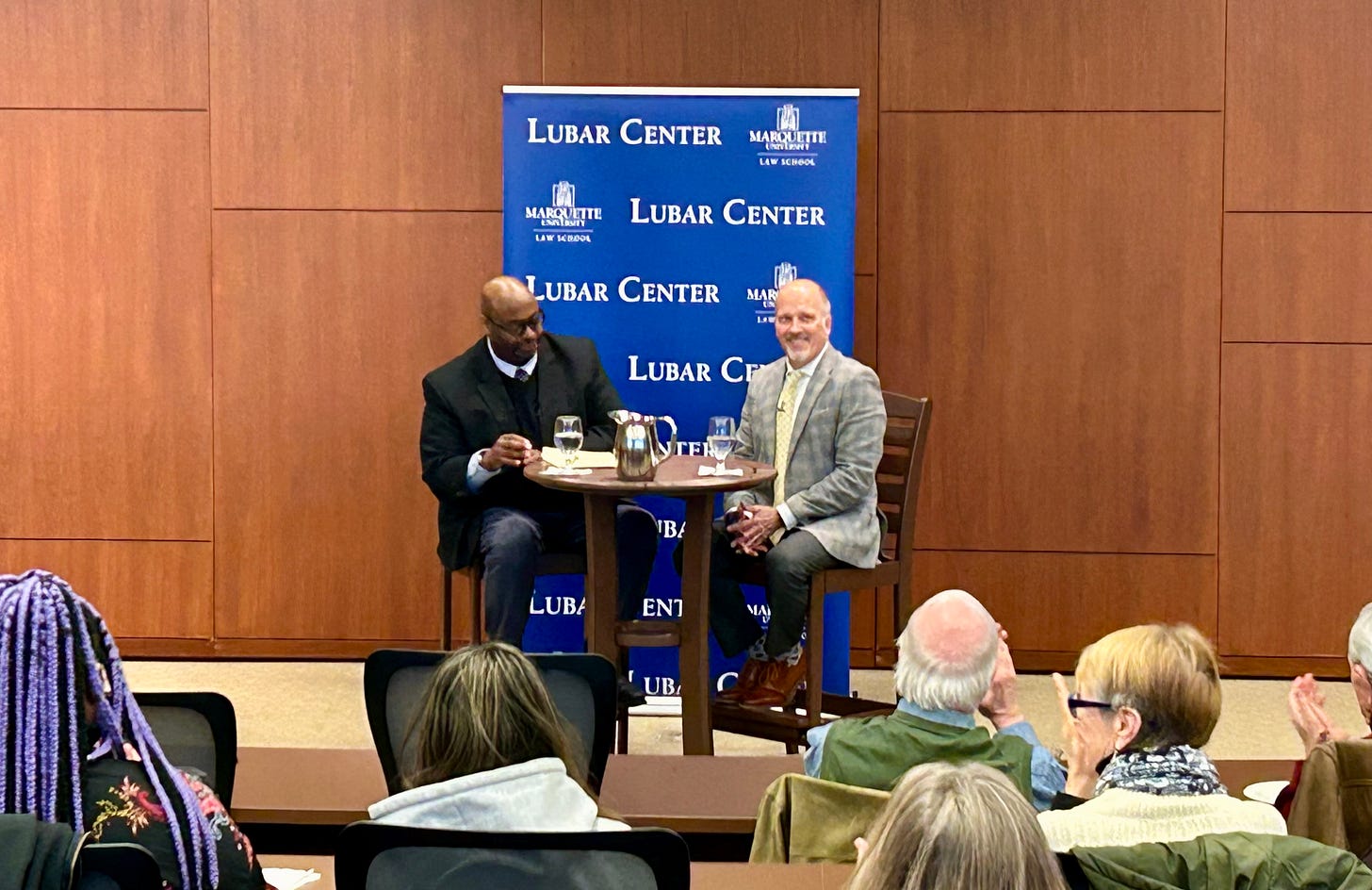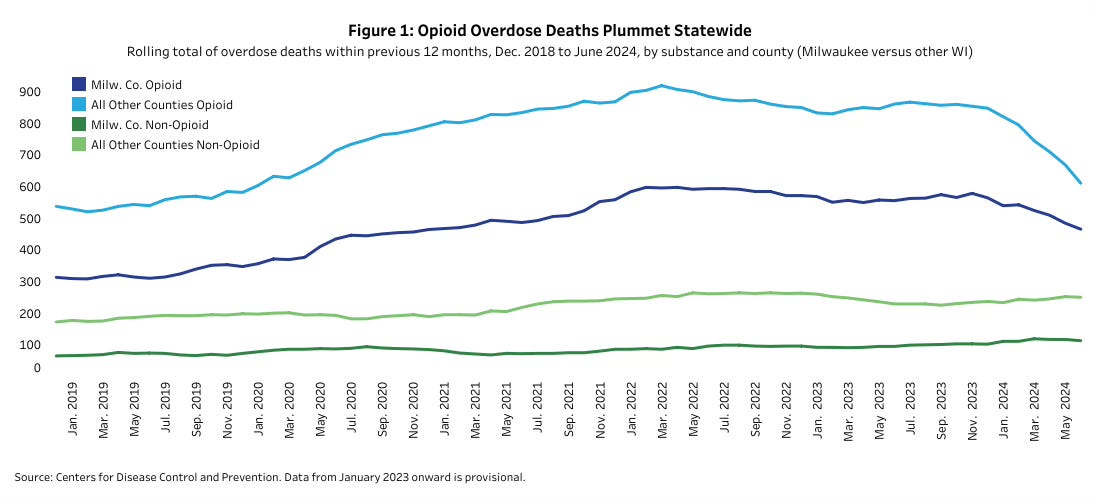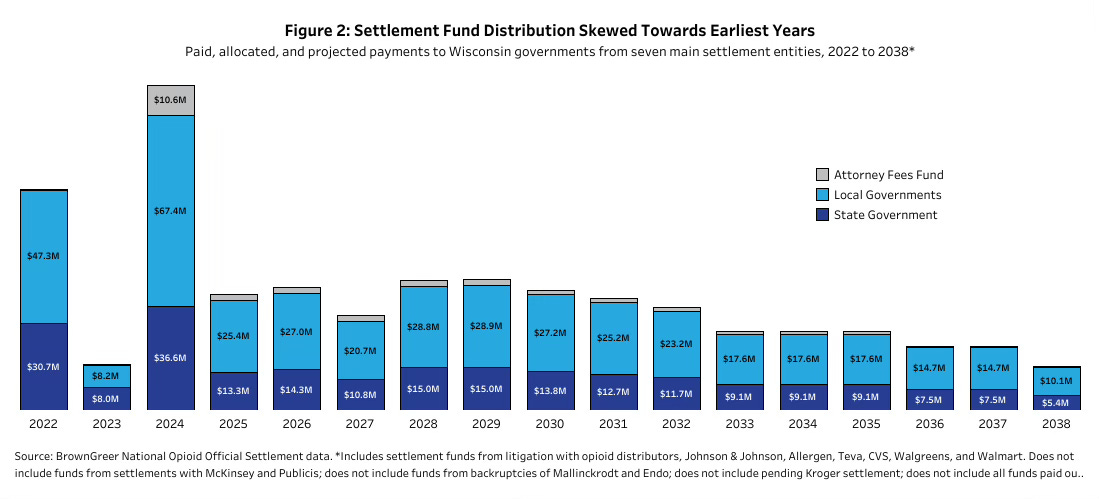As Attorney General, Brad Schimel refused to hold opioid manufacturers accountable
Funds coming from opioid settlements are now saving lives in Wisconsin. As state AG, Brad Schimel refused to join these lawsuits. That’s a problem as he seeks a seat on the Wisconsin Supreme Court.
The Recombobulation Area is a thirteen-time Milwaukee Press Club award-winning weekly opinion column and online publication founded by longtime Milwaukee journalist Dan Shafer. The Recombobulation Area is now part of Civic Media.

A new report from the Wisconsin Policy Forum brought forth some encouraging news — opioid overdose deaths are declining in Wisconsin.
The total number of deaths from opioid overdoses fell to their lowest level in more than four years, according to data from June 2024. From March 2021 to March 2022, there were 1,513 opioid overdose deaths in Wisconsin. From March 2023 to March 2024, that number was down to 1,268, and declining to its lowest number since the early months of 2020. This is still unacceptably high, but progress is progress. Hundreds of lives are being saved.
An important part of this progress, the report details, has to do with recent settlements with pharmaceutical manufacturers, retailers and distributors of opioids, funding from which has been arriving in Wisconsin in a big way.
In 2024, state and local governments in Wisconsin received a combined $104 million from settlements, according to the WPF report, of the roughly $780 million set to be distributed in Wisconsin through 2038.
In the conclusion of this report, the WPF says, “Early data show that settlement funds have already been put to use by law enforcement, corrections institutions, human services agencies, health departments and more. Policymakers should continue to seek out stories of success, as state and local agencies tailor their approach to the opioid epidemic to best meet the needs of Wisconsin residents.”
The largest share of state spending (27.5%) has focused on “capital projects at or for treatment facilities,” and other efforts have included the expansion of the Narcan Direct Program (which has involved “135 law enforcement agencies across the state”), and providing financial assistance for “Medicaid members in residential opioid treatment.” Milwaukee County, where more than 40% of opioid deaths have occurred, is receiving the largest share of local dollars, and is funding grants for prevention, treatment and harm reduction. Additionally, millions of dollars are being administered to Wisconsin's 11 tribal governments, which face significant challenges on this issue.
The fact that these settlement dollars are having an immediate impact is genuinely terrific news. So many lives across Wisconsin have been impacted by opioids, and any sign the tide might be turning should be seen as welcome news to the many whose lives have been shattered by this devastating addiction. It seems like, in Wisconsin, we all know someone who has been directly affected by this epidemic.
While it’s not the only factor, holding companies accountable for their role in this epidemic is proving to be an incredibly important piece of the effort to combat this devastation.
It was in the mid-2010s that efforts toward seeking accountability through litigation began to gain steam. It was then that the epidemic began to explode as overdose deaths from synthetic opioids like fentanyl began to rise. Corporations refused to cooperate with those seeking recourse and state attorneys general took new courses of action in the form of investigations, and more importantly, lawsuits.
Wisconsin’s Attorney General at that time was none other than Brad Schimel, the right-wing candidate running for Wisconsin Supreme Court. Schimel did not join those lawsuits.
As these life-saving funds come to Wisconsin and make a real, immediate impact, you have to wonder: Could things have unfolded differently if Brad Schimel was re-elected in the 2018 midterm election?
Schimel served as Attorney General in Wisconsin from 2015 to 2019, and during that time, he faced controversy over his actions on opioid settlements. In litigation that began around 2017, local governments began suing pharmaceutical companies like Purdue Pharma. That effort eventually included 71 of 72 counties, including Schimel’s home county of Waukesha. But as Attorney General, Schimel stubbornly refused to pursue that course of action. A 2017 Associated Press story details Schimel “defending his decision to hold off on suing drug companies over the country’s opioid overdose epidemic.” Democratic lawmakers were critical of Schimel’s lack of action, saying that has led to “Wisconsin counties taking matters into their own hands.” Urban Milwaukee’s Bruce Murphy penned a column on “Brad Schimel’s Opioid Problem.” On the campaign trail throughout the 2018 race, Schimel faced criticism for his refusal to join 18 other states in filing lawsuits against opioid manufacturers.
While this hasn’t emerged as one of the major topics in this year’s race for Wisconsin Supreme Court, liberal organization A Better Wisconsin Together (ABWT) is now running an ad on this issue.
While there are many issues at play in this race for Wisconsin — reproductive rights, redistricting, labor rights, checks and balances, etc. — this matter deserves more attention than it’s been getting. Schimel’s refusal to take on opioid manufacturers and companies connected to this epidemic during his time as Attorney General is deeply concerning. These manufacturers and distributors were very much in the wrong for pushing these harmful drugs on people, leading them to believe they are not addictive, significantly exacerbating — and profiting on — the crisis. Schimel, at the time, opted to join a 41-state investigation on the matter, which did not result in settlement dollars. He should have been joining the 71 counties across the state and the many states across the nation to take meaningful legal action.
Schimel’s unwillingness to pursue real accountability on this matter should be seen as a bigger problem for him in this campaign. It’s a question of judgment — obviously, an important factor for someone running for the state’s highest court. Cases will be before the next justice on holding large corporations accountable, and we need to know that whoever is elected to a 10-year term will pursue justice in cases like this one.
And as ABWT notes in its ads, Schimel was the only Wisconsin politician to take money from Purdue Pharma’s PAC, a group that also poured significant dollars into the Republican Attorneys General Association (RAGA), which also funded Schimel’s re-election campaign. You have to wonder what kind of role that might have played in Schimel’s decision not to pursue a lawsuit directed at opioid manufacturers. Given how much money has flooded this race — on pace to top $100 million — there are a myriad of questions to be asked of either Schimel or his opponent, Dane County Judge Susan Crawford, about the backing they’ve received, but Schimel’s history is especially concerning, given his record on this very issue.
Eventually, in 2019, it was Democratic Attorney General Josh Kaul who announced a lawsuit against Purdue Pharma.
We now know that these settlement dollars are making an impact and saving lives. It was important for elected officials to sue, and to take on these pharmaceutical companies to bring some level of accountability to those impacted by this devastating crisis.
Brad Schimel’s lack of action on the matter was an important issue in evaluating his record when he lost in 2018, and it shouldn’t be overlooked again now, in 2025, as he seeks a seat on the Wisconsin Supreme Court.
Dan Shafer is a journalist from Milwaukee who writes and publishes The Recombobulation Area. In 2024, he became the Political Editor of Civic Media. He’s also written for The New York Times, The Daily Beast, Heartland Signal, Belt Magazine, WisPolitics, and Milwaukee Record. He previously worked at Seattle Magazine, Seattle Business Magazine, the Milwaukee Business Journal, Milwaukee Magazine, and BizTimes Milwaukee. He’s won 18 Milwaukee Press Club Excellence in Journalism Awards. He’s on Twitter at @DanRShafer.
Subscribe to The Recombobulation newsletter here and follow us on Facebook and Instagram at @ therecombobulationarea.
Already subscribe? Get a gift subscription for a friend.
Part of a group who might want to subscribe together? Get a group subscription for 30% off!
Follow Dan Shafer on Twitter at @DanRShafer and at BlueSky at @danshafer.bsky.social.





Excellent piece!
Dan, thank you for bringing this issue forward. It is important that we see how campaign funding may affect policy. We need to get the money out of politics!
The amount of opioid money that is flowing to the state of Wisconsin and each County because of the settlements is significant. Counties are strapped for funding because of levy limits. My County has already received $1.7 million in opioid settlement funds.